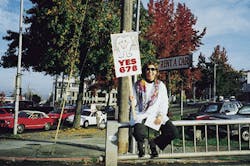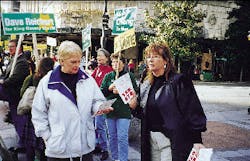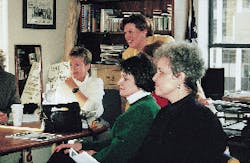The muffling of SHOUT
It was perhaps dental hygiene`s most splendid effort to attain autonomy. But a narrow margin of 50,000 Washington state voters and some mud-slinging by dentists ruined what seemed would be a joyous victory party on Election Eve.
Heidi Emmerling, RDH, MA
Author`s note: I dedicate this article to all those involved with SHOUT who worked on behalf of the dental hygiene profession, especially the "dirty half dozen plus three." This is your story.
November 4, 1997, 4 p.m.
Outside, it looks like a typical November day in Seattle: a bit overcast and drizzling. But on election eve, Washington state dental hygienists are filled with nervous energy. Initiative 678, also known as SHOUT (Support Hygienists and Oppose Unequal Treatment), will be put to the voters tomorrow. After 18 years of failed attempts in the legislature, voters will be able to decide if hygienists can practice independently and be self-regulated. Washington is the first state to place this issue on an initiative. Thus, inside SHOUT headquarters on the sixth floor of the Lloyd Building, it is a day like no other.
Carroll Twiss, SHOUT campaign manager, is listening to a radio spot produced by the opposition. "Do you want anyone but a dentist cutting your gums, scraping on your roots or giving you shots? I-678 will allow people with only three years of post-high-school education to be able to do these medical procedures. Vote No on I-678." The opposition also has claimed that I-678 is inconvenient for the consumer, that it will not improve access, and that the purpose is for hygienists to get rich. They claim that unsupervised practice in other states is a failure.
Despite the overwhelming number of signatures (272,000) collected to place the initiative on the ballot, despite polls showing a healthy margin of support, there is concern. For the past week, the public has been blitzed with TV ads, radio spots and mailings to absentee voters, urging a no vote on I-678. Polls show that SHOUT is sliding downwards about 1 percent per day for the past 15 days.
Twiss explains that this has been a difficult initiative because it is hard to draw large financial resources. She explains that SHOUT is not an emotional or financial draw for large organizations. They have not been able to draw large moneys from coalitions. Out of 120 newspaper publications, SHOUT has received 107 endorsements. In spite of this, large checks from organizations do not automatically follow. For the most part, financing has come from individual hygienists, dental hygiene organizations, and people closely involved with the SHOUT initiative.
Although some of the chief spokespersons for the opposition - Julie Zanner, Nancy Randall, and Vicky Parker - are dental hygienists, the opposition to SHOUT is composed primarily of dentists and they have raised $638,000. Jim Hedemark, the SHOUT fund-raiser, reports the opposition has outspent them by a margin of 4:1 on media coverage. Although SHOUT raised almost $436,000, the bulk of the money was spent just getting the initiative on the ballot. Gathering signatures was extremely expensive. The ADA has contributed $200,000 to oppose this measure. Washington State Dental Association has contributed over $225,000. Even dentistry`s guru, Gordon Christensen, contributed to the opposition.
A number of dentists, however, have defended SHOUT. Some two dozen have openly supported this initiative including Drs. Melvin Carlson and Felix Marcial. "It is sad to see the amount of money that the Washington State Dental Association is expending over the many years to keep hygienists under the dentists` control" writes Marcial. Campaign consultant Cathy Allen, president of Campaign Connections, reports there are approximately 150 other dentists who have quietly supported SHOUT.
Around the corner on Seventh Street on the 16th floor of the Tower Building, Jesse Israel of the Campaign Connections staff greets me. She is the SHOUT campaign executive. She is reviewing one of SHOUT`s radio spots, which mentions nationally acclaimed economist, Glenn Pascall, as well as the Washington State Board of Health and the Department of Health. Both sources refute the opposition`s claims that I-678 will not be good for consumers financially and would put the public at risk. Israel shows me a state-wide endorsement list which includes the AARP, the International Brotherhood of Teamsters, Northwest AIDS Foundation, Washington State AAUW, Washington State NOW/PAC, Washington State Democrats, Whatcom County Republicans, and a host of others.
Israel shows me Pascall`s report. In it, he states seven reasons why Washington consumers would benefit from independent practice:
- More consumer and provider choice.
- Safety.
- Bringing dental care to more people.
- Emphasis on preventive care.
- More available care.
- More affordable care.
- More appropriate care.
This study is impressive in light of Paschall`s qualifications: MPA from Sacramento State, author of several books, columnist for the Puget Sound Business Journal, former revenue director of the State of Washington, served four years as president of the Washington Research Council, and legislative assistant to Governor Daniel Evans. He has coordinated projects on affordable housing and regulatory reform.
Because the opposition has been able to reach voters through television ads, it has hurt the campaign. People who don`t read the newspapers get their information from TV. These ads are meant to frighten people and they have been relatively effective. Their effectiveness has been enhanced because voters have not seen or heard SHOUT on TV refuting these unfounded claims.
SHOUT has focused on an activity-based campaign which includes free press and activities. Without having TV spots, Twiss describes the campaign as a one-legged stool. The leg they have is very strong, but the stool is still wobbly and vulnerable without the TV ads.
Since Friday, hygienists have made a concerted effort to wave signs on busy freeway overpasses, hand out pamphlets at malls, and call in to local radio stations. Gail Gilman, RDH, a California Health Manpower Pilot Project participant, is up here to help with campaign efforts. Gilman has her master`s in human biology and nutrition. She has put her plans for independent practice on hold as she contemplates continuing her studies in the MD or PhD program.
It is getting dark, and she is returning from Westlake Mall to headquarters. I head back across the street to speak with her about public reaction to the initiative. She is giddy and bubbling with excitement. Not from the two marriage proposals she received while handing out pamphlets, but the bright reaction from the public.
"The response is so positive," she says. "Almost everyone I talked to said they have either already voted for it in the absentee ballot or they plan on voting for it tomorrow."
She tells me that she - along with other California HMPP participants, Judy Boothby, RDH, and Laurelyn Borst, RDH - have been participating in press conferences and answering people`s questions about how independent practice works in California. Borst and Boothby both work with elderly and medically challenged patients in unsupervised settings as a result of the HMPP. Borst is expected to arrive in Seattle later this evening.
Cathe Jennings, field coordinator for SHOUT, and Hedemark are swamped with phone calls from well-wishers around the country. Jan Loder, RDH, who flies back and forth from Washington to California to practice dental hygiene in both states, returns from a busy day of campaigning. She tells Hedemark that she found out her brother made a financial contribution and she can`t let him outdo her. She is ready to write a check to match his contribution.
About that time, Lee Roll, RDH, enters with signs she has been waving all day. Roll is one of the key players in the SHOUT campaign. She is a member of the "dirty half dozen," which is how the original six members of the SHOUT steering committee affectionately refer to themselves. Roll was fired from her job earlier this year due to her involvement with the SHOUT campaign. Her termination was heavily reported in local papers and the public was outraged. Through litigation, she was able to get her job back. For legal reasons, Roll is unable to talk about her job situation. All she says about the situation is, "I`m SHOUT`s poster child." We can only speculate as to the tension she must face every day she goes to work.
"If you want a real inside view of campaigning, be at the overpass at 41st and Aurora tomorrow morning at 6:30 a.m.," I am told. Allen, Roll, Gilman, and Sandy McQuirk, RDH, (another of the "dirty half-dozen") and any number of other folks will be there. "And bring some signs with you!"
November 5, 1997, 5:30 a.m.
Well, the alarm rang much too soon. Forget breakfast, forget my contact lenses, forget "frou frou" hair. Morning is not my best time but I can`t wait to capture the energy of these powerful and dynamic people.
At 6:30 a.m., sign-waving is in full gear. The weather is delightful, clear and crisp. Everyone is upbeat and full of optimism this morning. Cars are streaming past. Lots of waves and honks. A few dirty looks and middle fingers are raised. A television cameraman films the activities. A photographer from the newspapers takes our picture and writes down our names.
"Make eye contact with the motorists," Allen urges. "And smile."
I chat with Roll, McQuirk, and Gilman for a few minutes before they decide to go to a new intersection. This intersection is too saturated with signs. "It is important to have presence in as many locations as possible: no more than three signs per area."
I remain with Allen and her Campaign Connections staff, Jesse Israel and Parissh Knox.
"Our purpose here today is to urge people to go to the bottom of the ballot," Allen tells me. "There are four other volatile initiatives on the ballot. This is likely to be the only initiative that passes."
"When it passes," she says, "the real winners will be the kids and consumers of Washington who will hopefully get more frequent treatment at less cost from a hygienist they can trust. But as much as this will be a consumer victory, it will be a women`s victory. Dental hygienists are in the last major profession composed primarily of women and dominated by a profession composed primarily of men."
She explains that she is still optimistic about winning despite the negative ads. "But it will be close - closer than we originally thought."
Allen tells me the definite impact this has had on hygienists, especially the hygienists involved in the committee. "I have really seen professional growth. When these ladies first began speaking with the press, it was so painful to watch. They fumbled. They stuttered. They stammered. But look at them now. They have come to be exceptionally polished speakers. This campaign has maintained the high road. There has been no pettiness and bickering."
She also tells me a number of other states have approached the SHOUT committee for information on the initiative process. "There are 24 other states that can do this." Included in the list of states that are able to utilize the initiative process are: Alaska, Arizona, Arkansas, California, Colorado, District of Columbia, Florida, Idaho, Illinois, Maine, Massachusetts, Michigan, Mississippi, Missouri, Montana, Nebraska, Nevada, North Dakota, Ohio, Oklahoma, Oregon, South Dakota, Utah, Washington, and Wyoming.
Perhaps they will take Washington`s lead and consider this avenue. Based on the response she has witnessed, Allen states, "This is an issue whose time has come."
At 8:30 a.m., traffic is thinning and my stomach is grumbling. Time to grab something to eat and head to SHOUT headquarters to view other aspects of the campaign. As I arrive at headquarters, I see Anita Munson, RDH, chairperson for I-678. We embrace. We haven`t seen each other since the ADHA national convention in Atlanta in June. Munson has made immense financial and emotional commitment to the campaign. Throughout this project, Munson has maintained a long-distance engagement.
Tears are in her eyes as she says, "It has finally hit me. As I was waving my sign earlier today, I looked up at the sky, saw the logo, and said to myself, `This is it. After almost 20 years of hard work, this is it.` "
I comment to Munson about the commitment of all hygienists involved; 44 individuals have invested $1,000 or more; five have invested in excess of $5,000. Hygienists have put second mortgages on their homes, dipped into retirement and college funds, and logged credit card debt in order to loan the campaign much-needed funds. SHOUT has accumulated approximately $43,000 in debt, mostly to individual hygienists who dug deep to see this dream turn into a reality. "But the staff is committed too. When we were low on funds, Cathy Allen forfeited one month of her fee. Carroll Twiss donated $1,000 and loaned us even more. They really care about this issue," Munson says.
With Munson is Wendy St. Cyr, RDH, of Utah. St. Cyr is the newsletter editor for the Utah Dental Hygienists` Association and has done a lot of work lending her name in support of SHOUT. Munson and St. Cyr, both dressed in lab coats and carrying signs, have just returned from sign-waving at Denny Way and Stewart Street. They are taking a much-needed break and plan on returning to the intersection where Joyce Reedy, RDH from Lamar, Colo. and Claire Silk, RDH, from Winter Park, Colo. remain in their sign-waving mission. Along with their colleagues Gilman, Borst, and Boothby from the California HMPP, Silk and Reedy have spent much time with the press and the public discussing the safety and benefits of independent practice. Reedy has had an independent practice for more than nine years; Silk has had an independent hygiene practice for three years and employs two other dental hygienists.
I am eager to get to the intersection to meet my Colorado colleagues who I have admired for some time. I beg St. Cyr to walk with me to the intersection. She is full of energy and happy to accommodate. When we meet up, they are grinning from ear to ear and literally dancing in the street. "This is so great," Silk says. "We`ve had so many people tell us they voted yes." Silk and Reedy head back, while St. Cyr and I resume sign-waving. Several motorists stop and ask what the initiative means. I hand out pamphlets and they seem really pleased about the idea. One elderly lady, when stopped at the red light, rolls down her window and proudly says, "I voted for you." A bicyclist stops to tell me he voted for I-678 because he just couldn`t see what the opposition was all about. We also get a few raised middle fingers from guys driving BMWs and Lincoln Town Cars.
At noon, I`m dehydrated and need to head back to get a drink. St. Cyr refuses to leave her post. "I can`t leave," she says. "This is way too important. I`m staying here."
Back at headquarters, I see that Doreen Naughton, RDH, has arrived. She is a local hygienist who owns a business providing hygiene care to nursing home residents. I am also proud to say she is ADHA District XII Trustee, which includes my home state of Nevada. With Naughton is Sharon Golightly, RDH. Besides being part of the "dirty half dozen," Golightly is director of the dental hygiene program at Pierce College and is a doctoral candidate. Since the Warner-Lambert awards do not accept group nominations, the SHOUT committee decided to nominate Golightly as their representative for the award in the category of change-agent. I will meet up with them a bit later; there will be a briefing in Allen`s office at 2 p.m. Right now, I`m heading to Westlake Mall to see how the campaigning is going there.
On my way to the mall, I see Roll and Gilman returning. Apparently, things are fairly slow there. Time for a quick break before the briefing. We sit down for a bite to eat as Roll tells me a bit about the history of the initiative and how it will allow independent practice for hygienists. Although she has an interest in independent practice, her main interest is in self-regulation.
"It`s about time hygienists took control of licensing and regulating ourselves," she says.
She also explains that in the independent practice clause of the initiative, a hygienist must first work supervised in clinical practice for five years prior to petitioning for independent practice. The petition would go to the newly established dental hygiene regulatory board.
I ask Gilman about independent practice in California. "It is safe and it is effective," she says. "It angers me to see these ads [by the opposition to SHOUT] that insinuate hygienists aren`t qualified to treat the public unsupervised. It is already legal to work unsupervised in nursing homes, schools, hospitals, home health agencies, and public health clinics. It makes no sense that hygienists can work on sick people, old people, migrant workers, school children and American Indians, but not the general public. Where`s the logic here?"
It`s 2 p.m. and time for the final briefing prior to the reception. All the key players are present in Allen`s office. She starts out by emphasizing the positive: This may very well be the only initiative that passes. If that is the case, we can expect the press to appear at the reception. She went over the do`s (simple neat hair, strong make-up and lipstick, well-planned responses to likely questions) and the don`ts (no dangly earrings, "loud" clothing, tears, or excessive champagne until after the press leaves).
She also prepares the group for the negative: the final few days have been damaging to the campaign in the form of very negative television spots. Since SHOUT was outspent 4:1, the group should not be surprised that public support has shifted a bit. The other initiatives on the ballot are drawing a negative sentiment. Over $5 million has been spent opposing gun control, gay rights, legalization of marijuana, and SHOUT. This election will draw many conservative people to the ballots. Regardless of the outcome, Allen continues to emphasize the tremendous strides made towards public education. More people now know the role a dental hygienist plays in oral health.
The final moments in the briefing are spent acknowledging everyone`s efforts, discussing specific outfits to be worn, and planning on how each is going to spend the last few hours relaxing and preparing for the evening. The briefing is over at 3 p.m.
At 6:30 p.m., the key players are at it again, preparing for the reception at the Roosevelt Hotel. Several people are tying ribbons on balloons, some are hanging up posters and decorations, others are setting up televisions, VCRs, and computers. The rooms are festively transformed. There is lots of optimism here but lots of jitters as well. Downstairs in the lobby, ADHA President Maria Perno McKenzie, RDH, has arrived to be present for the election results.
"I`m so delighted to be here," she tells me. "Regardless of the outcome, whether SHOUT is ratified or not, the mere fact that this initiative process has taken place is a victory for hygienists across the country. It has renewed solidarity and the cohesiveness of hygienists everywhere. Just look at the number of out-of-state hygienists present here tonight."
At the reception, hygienists from Colorado, California, Nevada, and Utah are already present. Hygienists from Oregon and Arizona are also planning on attending. Hedemark echoes this concept of solidarity. "As of August 1, SHOUT has received at least one donation from every state in the country."
I go upstairs and observe the hubbub of activity. People are exchanging recent campaign snapshots. Others are making custom pro-SHOUT buttons. Pro-SHOUT articles from RDH magazine and Access are on display, as are the newspaper editorials officially endorsing SHOUT. Hedemark is busily selling raffle tickets for a limited number of wine bottles bearing labels with the SHOUT logo.
The reception is packed. Over 100 people have RSVP`d. I am able to have brief chats with national spokespeople like McKenzie and Naughton, meet with every one of the "dirty half dozen plus three" (Lisa Anthony, RDH, Tina Carlon, RDH, Bertha Dasher, RDH, Patty Funk, RDH, Nedra Jordan, RDH, as well as Golightly, McQuirk, Munson and Roll). I see all the campaign staff (Hedemark, Jennings, and Twiss, as well as the treasurer Gaye Anthony). Campaign Connections was represented by Israel and Tom Van Bronkhorst.
I become reacquainted with my other out-of-state colleagues Borst and Gilman from California, Reedy and Silk from Colorado, and St. Cyr from Utah. I have the pleasure of meeting the president of the Washington State Dental Hygienists` Association (and fellow ADHA delegate) Pixie Needham, as well as Ruth Gordon, RDH, WSDHA liaison to SHOUT, and Nancy Southwick, executive director of WSDHA. Becky Bogart, their lobbyist is present. Other Washington lobbyists also are present.
I also meet Mara Erickson, RDH, secretary of the Greater Seattle Dental Hygienists` Association. Patricia Doyle, RDH, a member of the RDH Advisory Board, is also present. Many other colleagues chat with me about individual experiences, including Jane Moreno, RDH, director of SmileSavers, a nonprofit mobile clinic which serves at-risk children. Jane was reportedly one of SHOUT`s vital individual investors. She is definitely one of the most passionate supporters of independent practice I have ever met.
At 8:30 p.m., the room gets quiet as the first returns from the absentee voters roll in: 55 percent opposed, 45 percent in favor. Although not ideal and we`d like to see it reversed, Allen had told us at the briefing that the absentee ballots would be conservative and not to be too concerned. Look for the second batch to catch up. Those will be important.
The salad and sandwiches arrive. Some people devour the food. Others are too nervous to eat. Munson gets a call from the Post-Intelligencer newspaper. She tells me her legs feel numb. They ask her what will happen tomorrow morning if I-678 passes. They also ask her what will happen if it is defeated. She says it hits her that this issue will never be over until independent practice and self-regulation are accomplished.
The second batch comes in: 53 percent opposed, 47 percent in favor.
"This is not good," Twiss says. At this point, the numbers should be reversed. She looks concerned. She makes a speech to the group telling them straight up she is concerned. "We need to be well over 50 percent to have a decent cushion for when the rest of the conservative absentee votes come in. At this point, it is not insurmountable, but it is not where we want to be. Let`s hope for a turnaround real quick."
A mood of concern envelops the room, but most refuse to get a defeatist attitude. Most have had extremely positive responses from patients, as well as from people on the street they have seen during the course of campaigning.
Another batch comes in: 52 percent opposed, 48 percent in favor. Cheers sound throughout the room, but the campaign staff members are aware that the numbers have not reversed and they are becoming more and more certain SHOUT will not pass. Still, people are holding out hope.
McKenzie smiles in the other room and serves as moral support. "I maintain that this is a victory no matter what happens. We will see the dental hygiene profession move forward as a result of the efforts of Washington State hygienists. They have paved the way for us, and hygienists are sticking together on this issue." She echoed Allen`s sentiment that the time for self-regulation and independent practice has come.
While members of the SHOUT steering committee effectively maintain an upbeat attitude, Borst takes me aside and confides, "I sure wish the numbers were reversed." She feels empathy for those who have sacrificed so much to make this a reality.
To raise everyone`s mood, cake and champagne are served. At this point it is probably in the back of most people`s minds that I-678 will not pass, but some refuse to admit it publicly, still holding out hope for a miraculous turn-around. People are focusing on the positive aspects of the campaign: taking the high-road, professional development, camaraderie, and solidarity.
Allen has been unable to be present for most of the evening. She has been serving as an election commentator for a local affiliate of the cable news network. Every time she comes on the air, the crowd smiles. We all see the smiley tooth she proudly wears on her lapel. Shortly before 11 p.m., she appears at the reception.
"Please tell us we still have hope, Cathy," Munson pleads.
Allen goes into one of the rooms with other campaign staff. Their faces are somber. Several minutes later, she comes out and concedes temporary defeat. Temporary because although I-678 did not pass with this first attempt, Washington State hygienists, as well as hygienists throughout the country, know this is not an insurmountable battle. Victory was within their grasp and they will reach again. With this concession speech, there are many red eyes in the room.
"No tears!" Allen orders.
I ask Roll, who is standing next to me, for the announcement about whether SHOUT will be regrouping soon. She is so overcome with emotion she cannot speak. The rest of the steering committee, composed of those real-life hard-working hygienists who have made such tremendous emotional and bank account-depleting financial commitments and have literally put their lives on hold for this campaign, are subdued as well. The mood is indescribable.
November 6, 1997, 7 p.m.
When I return home, I check my e-mail. Some of my online buddies are hungry for details: Why did it fail?
An upset hygienist in Spokane, for example, writes of responding to a dentist`s request to administer local anesthesia: "Do it yourself. Apparently, you think I am unqualified."
Another Spokane hygienist told me of an incident that happened when she went to work the next day. The radio announcer, in a poor attempt at humor, quipped, "I feel sorry for those of you who are in the dentist`s office today. Better not tell your hygienist you voted no or she will gouge your gums." She told me, "I felt like throwing the radio across the room and going home. I am so angry. I can`t believe dentists feel such contempt for our skills. It`s bad enough the public is afraid to see the dentist. Now, thanks to their ads, the public is now afraid to see dental hygienists."
November 7, 1997, 3 p.m.
I call SHOUT headquarters several days after my return. "How`s the mood there?" I ask Hedemark. "Getting better," he replies. Apparently, emotions are still going up and down. Those who were down immediately following the election are perking up and those who held it together for the first day or two are letting go now. Hedemark tells me there were a number of hygienists who were very disappointed over the results, so disappointed they called in sick the day after the election.
"Even so," Hedemark remarks, "all the good that came out of SHOUT is not invalidated by the narrow defeat. SHOUT lost by 50,000 votes which translates into just 1 percent of the voters - hardly a landslide defeat."
"What now?" I ask.
Hedemark states, "Our first priority right now is paying back these and other loans. As of today, we need to raise $43,000. If, and I stress if, we are able to retire this debt, the SHOUT committee will put any additional funds into an account for the next campaign. We are all very encouraged by our results."
Twiss tells me the reaction is not if they will try again. Rather, when or what they will try next. They are not sure whether to take the legislative or initiative route again or try a different approach through the court system. Twiss tells me that the initiative process is extremely difficult and hygienists were very brave for trying it. It takes an immensely healthy financial foundation, approximately $1 million to consider this path. The main message she wants to get across is that dental hygienists have made great strides through this process of taking the issue to the voters. Because of the efforts of the "dirty half dozen plus three," a message was sent to the people: hygienists are not just technicians but professionals with special knowledge and skills. Twiss feels there is an increased amount of respect for hygienists out there now.
November 9, 1997
Munson has been away at the Washington State Dental Hygienists` Association House of Delegates meeting. I`m finally able to speak with her on Sunday. Despite the positive aspects of the campaign, Munson expresses anguish over the defeat. She said that the real defeat is to the consumers and children who would have been served with I-678 passage. Hygienists throughout the country are grieving.
With justified anger in her voice, Munson says, "It is about time that those hygienists out there who have been undermining our profession by denying we even have a profession, by denying that we have enough education to make a difference, by denying that we have the capability to treat people directly, finally step forward and take responsibility for diminishing our profession to their colleagues."
The upside of this, Munson states, is that there are now even more conservative hygienists who realize it is time to get involved. "The number of involved hygienists has now multiplied. They see that it takes every hygienist to recognize that now is the time to dig deep within ourselves and take issues to heart."
Hygienists have seen with their own eyes the disrespect the dental community has for them via the negative television ads and the ADA resolutions. Munson states the mood now is solidarity. "It serves as a wake-up call to hygienists about how little dentists regard our professionalism, education, and collaborative contribution to their financial bottom line." She states she would not be at all surprised if hygienists walk into their jobs tomorrow with a very different attitude. Hygienists will ask themselves what they have done to sell themselves short, all in the name of being a cooperative "team player."
The primary goal of SHOUT was to protect the educational practice standards of dental hygiene that we now have. Our standards are under attack as evidenced by the resolutions recently adopted by the ADA. Folks in Washington State tell me that fighting these attacks dovetails into SHOUT`s mission statement. Thus, after their primary goal of retiring the outstanding debt, Washington State hygienists will be back fighting for this issue. The rest of the country has heard their SHOUT on behalf of the hygienists everywhere. Let?s look forward to the rest of the country?s hygienists not only hearing them, but actually joining in that chorus.
To contact SHOUT, write or call to: SHOUT Committee, 603 Stewart St. #604, Seattle, WA 98101; (206) 344-4130
This article was written by Heidi Emmerling, RDH, MA. She is a consulting editor for RDH, a writer, speaker, and clinician from Sparks, Nevada. Her e-mail address is [email protected].
`[Lee] Roll was fired from her job earlier this year due to her involvement with the SHOUT campaign. Her termination was heavily reported in local papers and the public was outraged. Through litigation, she was able to get her job back. For legal reasons, Roll is unable to talk about her job situation. All she says about the situation is, "I`m SHOUT`s poster child." We can only speculate as to the tension she must face every day she goes to work.`
`[Wendy] St. Cyr is the newsletter editor for the Utah Dental Hygienists` Association and has done a lot of work lending her name in support of SHOUT ... St. Cyr [has] returned from sign-waving at Denny Way and Stewart Street ... I`m dehydrated and need to head back to get a drink. St. Cyr refuses to leave her post. "I can`t leave," she says. "This is way too important. I`m staying here." `
`Gail Gilman [right], a California Health Manpower Pilot Project participant, is up here to help with campaign efforts. Gilman has her master`s in human biology and nutrition. She has put her plans for independent practice on hold as she contemplates continuing her studies in the MD or PhD program ... I ask Gilman about independent practice in California. "It is safe and it is effective," she says. "It angers me to see these ads that insinuate hygienists aren`t qualified to treat the public unsupervised. It is already legal to work unsupervised in nursing homes, schools, hospitals, home health agencies, and public health clinics. It makes no sense that hygienists can work on sick people, old people, migrant workers, school children and American Indians, but not the general public. Where`s the logic here?" `
Cathy Allen (standing) leads final briefing while Claire Silk (left to right), Patty Funk, and Ruth Gordon listen.
`It`s 2 p.m. and time for the final briefing prior to the reception. All the key players are present in Allen`s office. She starts out by emphasizing the positive: This may very well be the only initiative that passes ... She also prepares the group for the negative: the final few days have been damaging to the campaign in the form of very negative television spots. Since SHOUT was outspent 4:1, the group should not be surprised that public support has shifted a bit. The other initiatives on the ballot are drawing a negative sentiment. Over $5 million has been spent opposing gun control, gay rights, legalization of marijuana, and SHOUT. This election will draw many conservative people to the ballots.`





